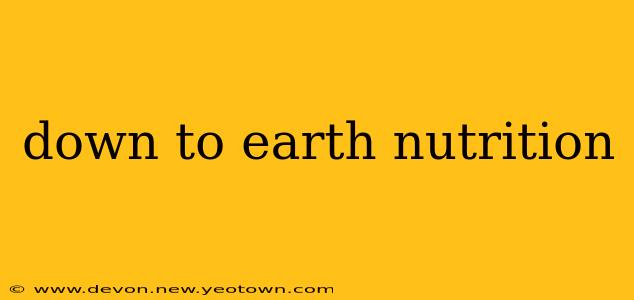Let's be honest, the world of nutrition can feel overwhelming. We're bombarded with conflicting information, fad diets, and expensive supplements, promising miraculous results. But what if I told you that truly nourishing your body doesn't require complicated meal plans or a hefty price tag? This is where down-to-earth nutrition comes in – a philosophy focused on simple, whole foods and sustainable practices. It’s about understanding your body's needs and making conscious choices that support your overall well-being.
My journey into down-to-earth nutrition started years ago, when I felt utterly lost in the sea of dietary advice. I was constantly chasing the next "miracle" food or diet, only to feel more confused and frustrated. Then, I discovered the power of simplicity – of focusing on real food and listening to my body. This approach isn't just about weight management; it’s about fostering a healthy relationship with food and feeling your best from the inside out.
What is Down-to-Earth Nutrition?
Down-to-earth nutrition isn't a restrictive diet; it's a lifestyle. It emphasizes:
- Whole, unprocessed foods: Think fruits, vegetables, whole grains, lean proteins, and healthy fats. These foods are packed with nutrients and fiber, keeping you feeling full and energized.
- Mindful eating: Paying attention to your hunger and fullness cues, savoring your meals, and eating without distractions.
- Sustainable practices: Choosing foods that are locally sourced and produced in an environmentally responsible way.
- Flexibility and balance: Allowing for occasional treats and not feeling guilty about indulging every now and then. It's about finding a sustainable approach that works for your lifestyle.
- Listening to your body: Understanding your individual needs and preferences, rather than following strict guidelines.
What are the benefits of down-to-earth nutrition?
Embracing down-to-earth nutrition can lead to numerous benefits:
- Improved energy levels: Whole foods provide sustained energy, unlike processed foods that can lead to energy crashes.
- Better digestion: Fiber-rich foods support healthy gut function.
- Weight management: A balanced diet, combined with regular exercise, can help you achieve and maintain a healthy weight.
- Reduced risk of chronic diseases: A diet rich in fruits, vegetables, and whole grains is associated with a lower risk of heart disease, type 2 diabetes, and certain cancers.
- Improved mental well-being: Nourishing your body with wholesome foods can positively impact your mood and mental clarity.
How to Start Your Down-to-Earth Nutrition Journey
Starting your down-to-earth nutrition journey doesn't have to be daunting. Here are a few simple steps:
- Focus on adding, not restricting: Instead of eliminating entire food groups, focus on adding more fruits, vegetables, and whole grains to your diet.
- Cook more meals at home: This gives you greater control over ingredients and portion sizes.
- Read food labels: Become more aware of what's in your food and choose options with fewer processed ingredients.
- Stay hydrated: Drink plenty of water throughout the day.
- Don't be afraid to experiment: Try new recipes and find what works for you.
Is Down-to-Earth Nutrition Right for Everyone?
Yes, the principles of down-to-earth nutrition are generally suitable for most people. However, it's always recommended to consult with a healthcare professional or registered dietitian before making significant changes to your diet, especially if you have any underlying health conditions. They can help you create a personalized plan that meets your specific needs and goals.
What if I have specific dietary needs or restrictions?
How can I incorporate down-to-earth nutrition if I'm a vegetarian/vegan?
Vegetarian and vegan diets can be very rich in down-to-earth nutrition. Focus on a variety of plant-based proteins, whole grains, fruits, and vegetables. Ensure you're meeting your vitamin B12 requirements, which can be challenging on a vegan diet.
What about allergies or intolerances?
If you have allergies or intolerances, carefully check food labels and avoid any ingredients that trigger a reaction. You can still embrace down-to-earth principles by focusing on foods that you can safely consume.
Can I still eat out and follow down-to-earth principles?
Absolutely! When eating out, opt for restaurants that offer fresh, whole-food options. Be mindful of portion sizes and choose dishes that are less processed.
Down-to-earth nutrition is all about a sustainable, balanced approach to eating that honors your body's needs and respects the planet. It's not a quick fix; it's a journey of self-discovery and well-being. By focusing on simple, wholesome foods and mindful choices, you can nourish your body and live a healthier, happier life.

